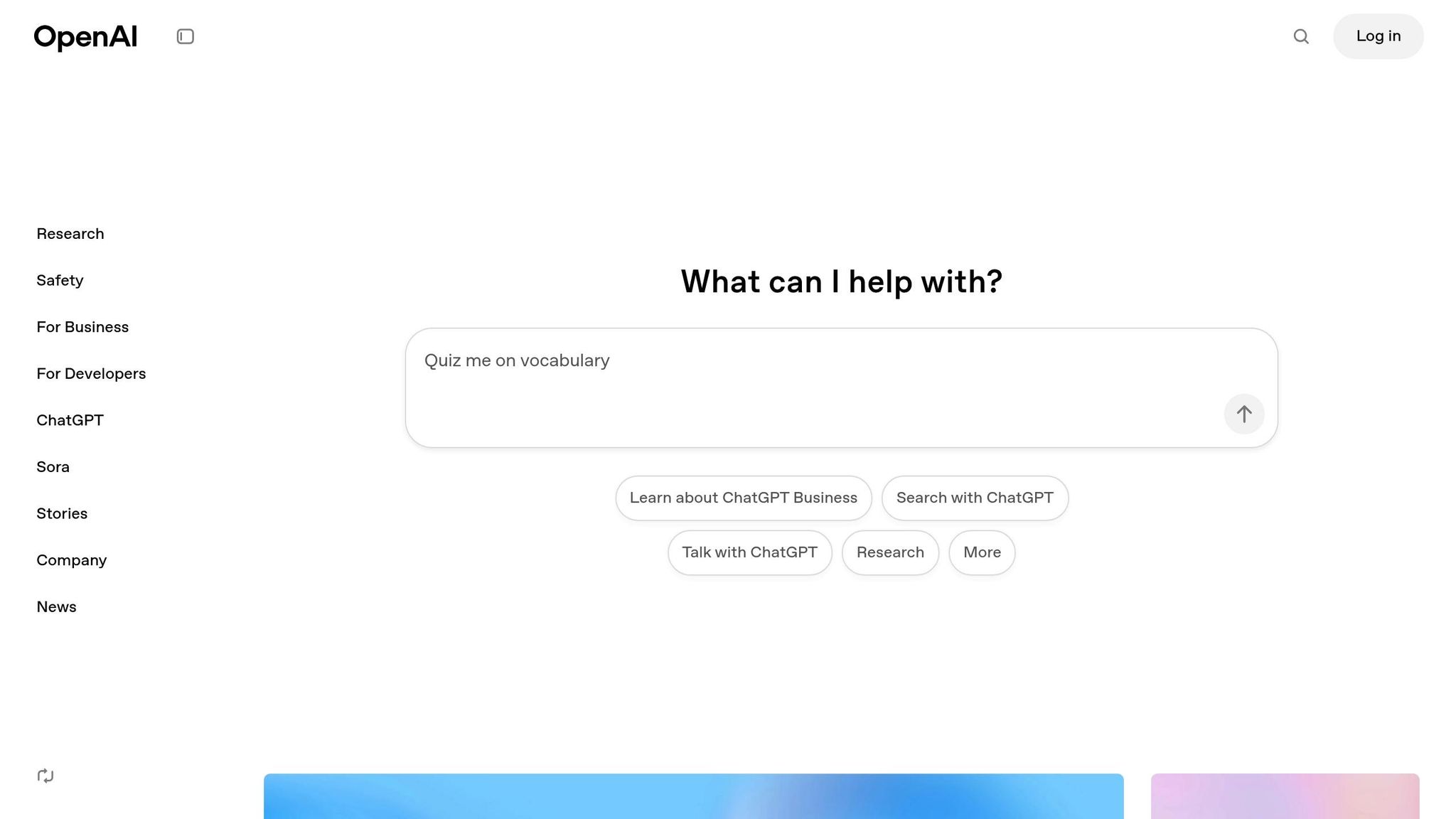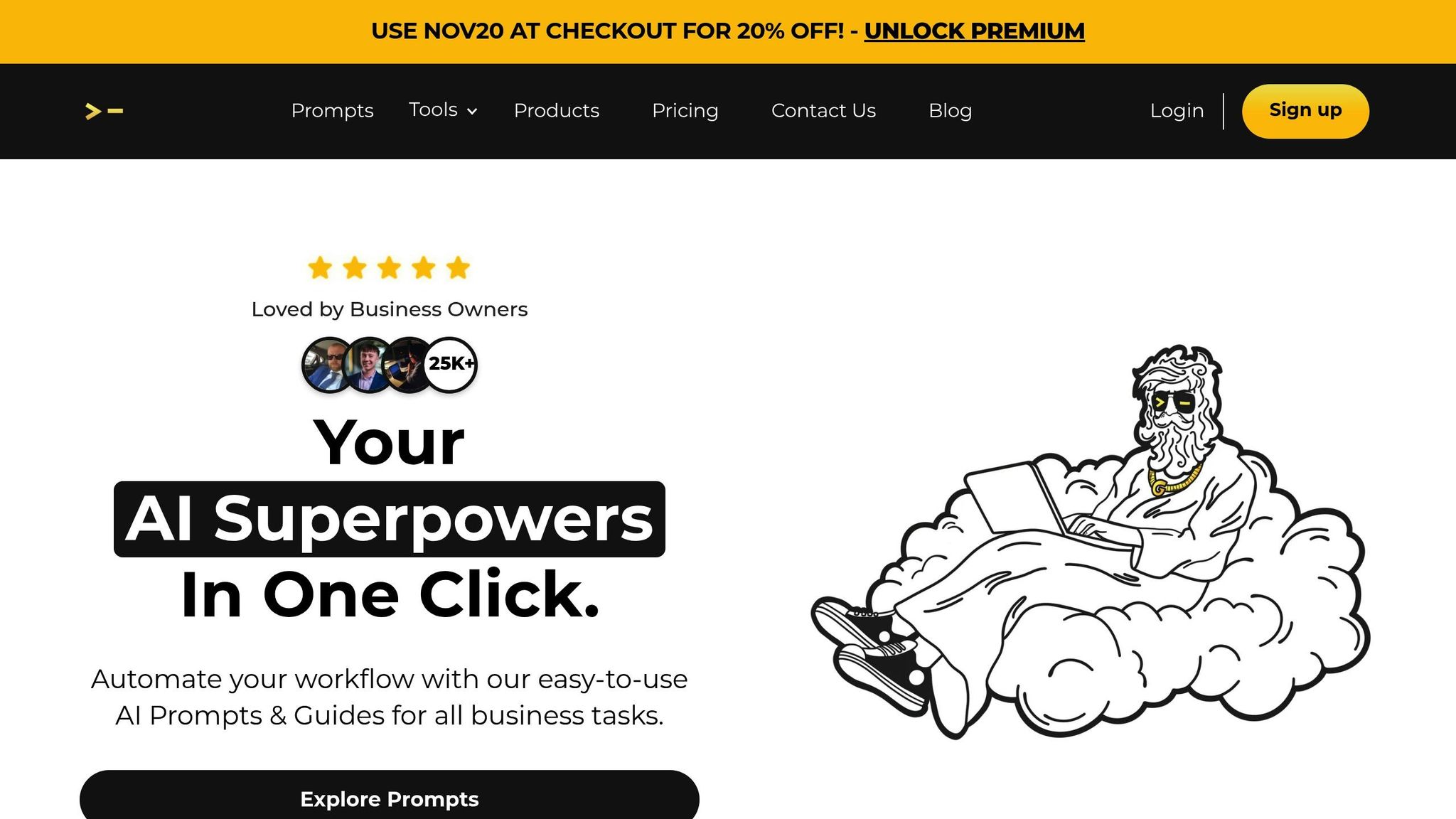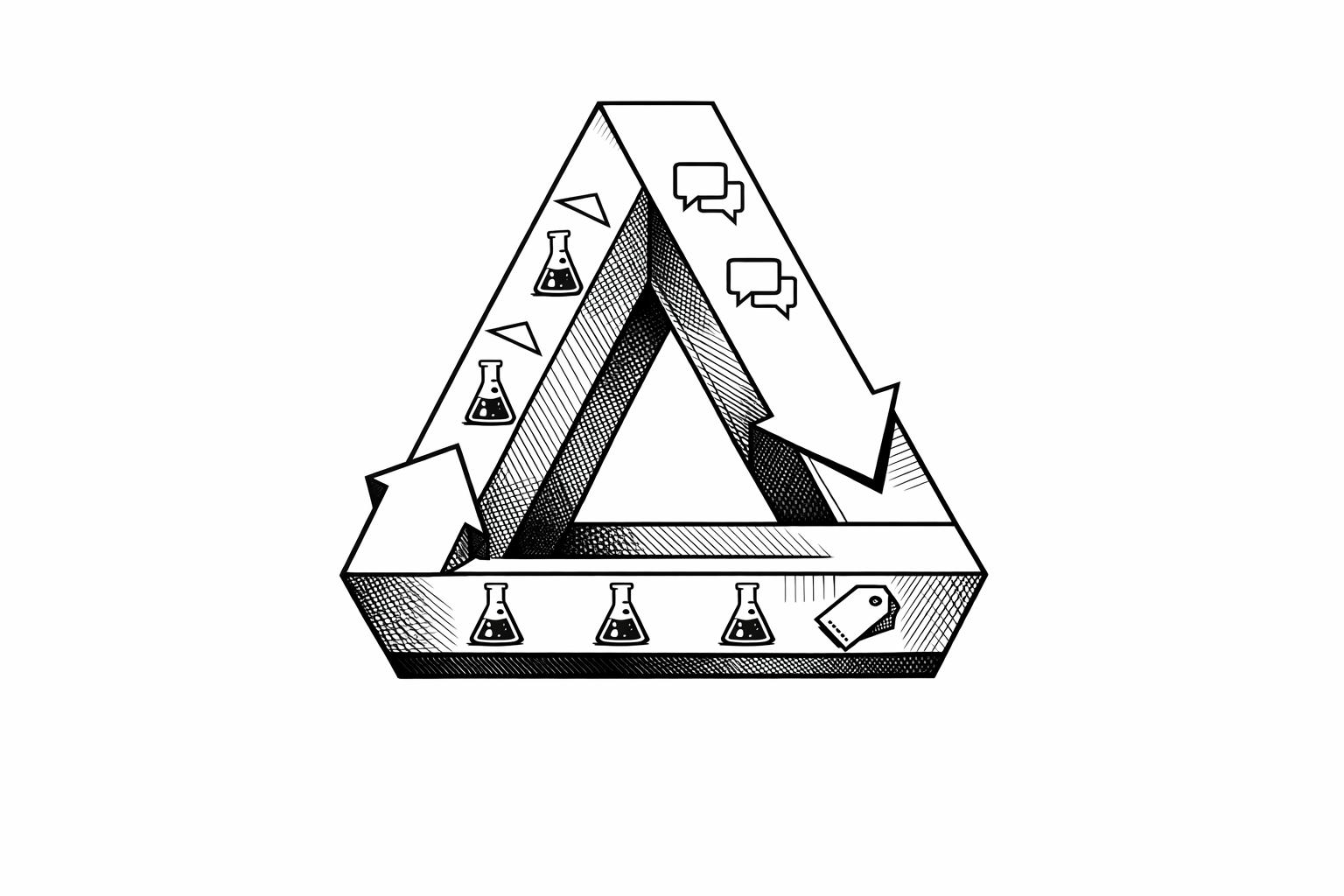How to Get Better AI Results Without Spending Hours on Prompts

Spending hours refining AI prompts? You don’t have to. Here’s the secret: pre-built prompt libraries and automated workflows can save you time while improving results. Instead of trial and error, you can use tested templates and tools designed for specific tasks, whether it's writing, marketing, or analysis.
Key Takeaways:
- The Problem: Crafting AI prompts manually is time-consuming and error-prone. Vague instructions or overly complex prompts often lead to poor outputs.
- The Solution: Use curated prompt libraries like God of Prompt (offering 30,000+ templates) or pre-built workflows to simplify tasks.
- Why It Works: These tools reduce guesswork, improve output quality, and streamline repetitive processes like marketing campaigns or content creation.
For example, God of Prompt provides:
- Writing Pack: $37 for 200+ writing-focused prompts.
- Complete AI Bundle: $150 for 30,000+ prompts across all AI models, with lifetime updates.
ChatGPT Prompt Fixer: Turn Vague Ideas into High-Performance AI Prompts

Problems with Manual AI Prompting
Crafting effective AI prompts from scratch can feel like a daunting task, especially when it starts eating into your productivity. What might seem like a quick job can easily turn into a time sink, leaving you questioning whether the effort is even worth it. These inefficiencies highlight the need for a more efficient way to approach prompt creation.
Why Prompt Engineering Takes So Much Time
The process of refining prompts can quickly become a bottleneck. You draft something, get lackluster results, and then spend even more time tweaking it. Often, this involves digging through forums, articles, or tutorials to figure out what works best. Each tweak requires careful analysis - adjusting tone, tweaking context, and fine-tuning instructions - all to get closer to the desired outcome.
Handling multiple versions of a single prompt only complicates things further. Without a clear system in place, it can feel like you’re spinning your wheels trying to find the perfect phrasing.
The complexity grows when you’re juggling prompts for different tasks. A prompt that nails it for marketing copy might completely miss the mark for data analysis or customer support. Each use case demands a unique approach, and this trial-and-error process not only eats up time but also increases the likelihood of errors creeping into your work.
Common Mistakes in Manual Prompt Creation
Even seasoned users can slip up, leading to wasted time and poor results. One frequent mistake is giving unclear or overly vague instructions. For example, phrases like "make it better" or "write something professional" leave the AI guessing, often resulting in unfocused responses that require heavy editing.
Another issue is overloading prompts with unnecessary background details. This can dilute the AI’s focus, making it harder for the tool to deliver precise results. Inconsistent formatting is another trap - switching between bullet points, numbered lists, or paragraphs can confuse the AI, leading to outputs that don’t align with your expectations.
Forgetting to specify the desired output format is another common misstep. If you ask for a blog post but don’t outline details like word count, tone, or target audience, you’re likely to end up with content that needs major revisions.
Finally, failing to tailor prompts to the specific strengths and limitations of the AI model can limit its effectiveness. A prompt designed for creative writing won’t necessarily bring out the best in a model that excels at analysis, and vice versa.
These challenges make it clear why pre-built workflows and curated libraries are game-changers. They can save time, reduce errors, and help professionals unlock the full potential of AI technology.
Using Curated AI Prompt Libraries for Better Results
Curated libraries provide ready-made prompts that can simplify your workflow and save time.
How Curated Libraries Make Work Easier
These libraries are a game-changer for handling common business tasks. Instead of spending valuable time crafting a prompt from scratch, you can pick a pre-built template that fits your needs and start generating results right away. It’s like having a shortcut to quality outcomes.
Typically organized by task or industry, curated libraries make it easy to find the right template. This streamlined approach not only speeds up your work but also cuts down on the need for multiple revisions. A great example of this efficiency can be seen in the offerings from God of Prompt.
What God of Prompt Brings to the Table

God of Prompt highlights just how helpful curated libraries can be. With over 30,000 AI prompts neatly categorized to meet a variety of professional needs, it’s designed to handle an impressive range of business scenarios.
For more complex projects, the platform provides mega-prompts. These are detailed templates tailored for tasks that require more in-depth input, giving you a solid starting point for challenging projects.
Additionally, lifetime updates ensure your library stays up-to-date, while the Notion-based interface makes it easy to search and access exactly what you need.
Here’s what God of Prompt offers:
- Writing Pack: Includes 200+ mega-prompts and costs $37.
- Complete AI Bundle: Contains 30,000+ prompts and costs $150.
Both plans come with lifetime updates, so you’ll always have access to the latest tools.
Pre-Built Workflows and Automation Tools
Pre-built workflows combine multiple prompts into streamlined processes, automating tasks that would otherwise require repetitive manual effort.
Why Pre-Built Workflows Are More Effective
Traditional prompting often involves several manual steps - brainstorming, refining, formatting - that can quickly become time-consuming. Pre-built workflows eliminate these inefficiencies by automating the entire process. You provide your input once, and the workflow takes care of the rest. It knows which prompts to use, the correct sequence to follow, and how to transfer information between steps.
This is especially useful for routine business tasks. Take marketing campaigns, for instance. They often follow a predictable sequence: researching the audience, crafting key messages, creating content variations, and optimizing for multiple channels. A well-constructed workflow can handle all these steps automatically, delivering consistent and reliable results every time.
Beyond saving time, pre-built workflows also improve output quality. When prompts are designed to work together as part of a larger process, the results are more cohesive and practical. Each step builds on the last, creating a logical flow that piecemeal prompts simply can’t replicate. This smooth integration lays the groundwork for the advanced time-saving features offered by automation tools.
How Automation Tools Save Time
Automation tools take the efficiency of pre-built workflows to the next level by eliminating repetitive tasks entirely. For busy professionals, these tools remove common bottlenecks from daily routines.
Here’s how they make life easier:
- Batch processing: Process multiple inputs at once. Instead of handling one task at a time, you can run a workflow across dozens - or even hundreds - of items in a single go.
- App integrations: Connect workflows directly to tools you already use. Outputs can flow straight into your content management system, CRM, or project management software - no copy-pasting required.
- Customizable templates: Adjust workflows to suit specific needs. Whether it’s tweaking tone, format, or focus, you can modify templates without rebuilding the entire workflow. This flexibility allows one workflow to serve multiple purposes across different teams or projects.
- Scheduled execution: Automate tasks to run on a schedule. Weekly reports, monthly calendars, or daily social media posts can generate automatically, leaving you with only periodic reviews instead of constant oversight.
- Learning capabilities: Advanced tools improve over time by analyzing what works best. They track performance data, refine outputs, and optimize future results - all in the background - so your workflows keep getting better without extra effort.
sbb-itb-58f115e
Choosing the Right Tools: Features and Pricing
When it comes to boosting efficiency with automated workflows, the choice of tool can make all the difference. A well-designed AI prompt tool doesn’t just save time - it turns hours of manual work into minutes of polished output. By combining automation with curated libraries, the right tool ensures seamless productivity.
What to Look for in AI Prompt Tools
Here are some key features to prioritize when selecting an AI prompt tool:
- Multi-model support: Look for platforms that offer a variety of AI models to handle different project requirements with ease.
- Extensive libraries: Tools with over 30,000 prompts organized by specific business needs can save you significant time.
- Easy navigation: Intuitive categorization and fast search capabilities should complement your existing workflow automation.
- Lifetime updates: Make sure your tool evolves alongside advancements in AI models.
- Multi-format compatibility: Choose tools that support both text and visual content creation.
- Custom prompt creation: The ability to craft prompts tailored to your brand voice and industry-specific terminology is a must.
With these criteria in mind, let’s take a closer look at the plans and pricing offered by God of Prompt.
God of Prompt Plans and Pricing
God of Prompt provides flexible plans designed to match your unique needs, helping you avoid unnecessary expenses. All plans come with lifetime updates, ensuring your tool stays relevant as AI evolves.
| Plan | Price | Key Features | Best For |
|---|---|---|---|
| Free | $0 | 1,000+ ChatGPT prompts, 100+ Midjourney prompts, 10 Mega-Prompts | Testing the platform, occasional users |
| Writing Pack | $37 | 200+ writing-focused Mega-Prompts, guides | Content creators, bloggers, copywriters |
| ChatGPT Bundle | $97 | 2,000+ Mega-Prompts, all premium ChatGPT prompts | Text-focused businesses, consultants |
| Midjourney Bundle | $67 | 10,000+ Midjourney prompts, creation guides | Designers, marketers, visual content teams |
| Complete AI Bundle | $150 | 30,000+ prompts across all AI models, unlimited custom prompts | Agencies, larger teams, multi-format needs |
The Complete AI Bundle stands out as a top choice, offering access to 30,000+ prompts for just $150 - equating to less than $13 per month in the first year. It also comes with a 7-day refund policy, reducing buyer risk, and uses a Notion-based system for easy access without the hassle of installations.
For smaller teams or solo professionals, the Writing Pack or ChatGPT Bundle provides a more focused and affordable solution. On the other hand, larger organizations or agencies will appreciate the wide-ranging capabilities of the Complete AI Bundle, which supports multiple departments and diverse content needs.
This pricing structure is designed to grow with you, offering clear upgrade paths as your requirements expand over time.
Best Practices for Better AI Results
Automated workflows and curated libraries can take you far, but applying a few smart strategies can make a world of difference in your AI results. Consistency and quality don’t just happen - they’re the result of thoughtful practices that help you get the most out of your tools. Often, the gap between average and standout AI output lies in following these proven methods.
Use Tested and Reliable Prompts
Starting with well-tested prompts saves time and ensures better outcomes. Crafting prompts from scratch can be a trial-and-error process that eats up hours without guaranteed success. Research highlights that refining instructions - known as prompt optimization - plays a key role in improving the performance of large language models. Clear, specific, and concise prompts help align the AI’s responses with your goals.
For best results, provide detailed context. This might include background information, scenarios, or even assigning a persona to guide the AI’s tone and focus. For instance, instead of a vague request like, "Write marketing copy", try something more specific: "As a B2B SaaS marketing manager, write email copy for a 30-day free trial offer targeting small business owners."
Using curated prompt collections can also set you up for success from the get-go. These libraries are designed to deliver consistent results, but don’t stop there - your prompts should grow and adapt alongside the technology.
Keep Your Prompts Updated
AI technology evolves quickly, and what worked flawlessly a few months ago might not deliver the same results today. Regularly reviewing and tweaking your prompts ensures that your workflows stay effective as AI capabilities improve. A small adjustment here or there can often restore peak performance.
Emerging tools for automated prompt optimization are making this process less labor-intensive. Instead of manually testing every tweak, you can now rely on systems that analyze usage data to suggest updates. Dedicate time each month to review your most-used prompts, especially if they’re tied to critical tasks like content creation. For example, if recent updates have improved the AI’s ability to understand tone or context, you might refine your templates to take advantage of those upgrades.
Keeping your prompts fresh ensures that your workflows remain efficient and aligned with your goals.
Invest in Lifetime Updates for Long-Term Success
AI platforms that offer lifetime updates provide a lasting edge. Static prompt libraries can quickly fall behind as new models are launched and existing ones are updated. Lifetime updates ensure your tools stay relevant by continuously incorporating advancements and improvements.
With lifetime updates, your prompt library evolves alongside the technology, saving you from compatibility headaches or extra licensing fees. This means you can confidently build workflows around a stable, ever-improving foundation. It’s a long-term investment that ensures your team isn’t left scrambling to adapt every time AI takes a leap forward.
Conclusion: Get Better AI Results in Less Time
Let’s wrap this up with a key insight: mastering AI is all about removing the friction in your workflow. The most efficient users - those saving over 20 hours a week - have figured this out. They’ve eliminated the small, repetitive obstacles that often push others back into outdated, time-wasting habits.
Instead of relying on endless trial and error, take advantage of curated libraries, pre-built workflows, and automation tools. These resources eliminate the need to master complex prompt engineering from scratch, making the process far more efficient.
The quality of AI output hinges on how clearly and effectively you communicate with the technology. For example, God of Prompt’s extensive library of over 30,000 tested prompts offers detailed, context-rich instructions tailored to business needs like marketing, SEO, and productivity. This ensures that your interactions with AI are purposeful and aligned with real-world applications.
Static libraries can quickly lose their edge as AI models evolve. That’s why platforms offering lifetime updates are vital - they keep your workflows relevant and effective as technology advances. This shift turns AI from a frustrating experiment into a dependable tool for boosting productivity.
With 80% of business leaders already using generative AI, the difference isn’t about technical know-how - it’s about choosing the right systems. By leveraging proven prompt libraries and automation workflows, you can join the ranks of power users who consistently achieve better results in less time.
The secret to success with AI isn’t spending countless hours perfecting prompts - it’s about choosing the right tools to make the process seamless and effective.
FAQs
How can curated prompt libraries like 'God of Prompt' help improve AI-generated content and save time?
Curated prompt libraries, like those provided by God of Prompt, simplify the creation of AI-generated content by offering ready-made, optimized prompts designed for specific tasks. These prompts are carefully developed to deliver strong results from the outset, cutting down on the guesswork and fine-tuning often required.
Leveraging these libraries can save you valuable time while ensuring reliable and polished outputs. They’re a great tool for boosting productivity and aligning with business objectives effectively.
How can pre-built workflows and automation tools help save time and improve AI results?
Pre-built workflows and automation tools are here to take the hassle out of handling complex or repetitive tasks. They offer ready-made frameworks that cut down on trial and error, helping you skip the tedious setup and get straight to achieving great AI-driven results.
By automating routine processes, these tools free up your time to concentrate on the bigger picture - whether that’s crafting creative strategies or tackling high-level decisions. The result? You save time, maintain consistent outcomes, and boost productivity across tasks like content creation, data analysis, or customer support.
Why is it worth investing in AI tools with lifetime updates, and how do these updates enhance AI-generated results over time?
Investing in AI tools with lifetime updates is a smart move if you want to stay ahead without racking up extra costs. As AI technology keeps advancing, these updates improve the tool’s performance, making it sharper, faster, and better suited to current demands.
With regular updates, you can expect improvements in language processing, expanded prompt capabilities, and the addition of features designed to save time and increase efficiency. This means your AI tool stays relevant and reliable, whether you're using it for personal projects or business purposes.





















